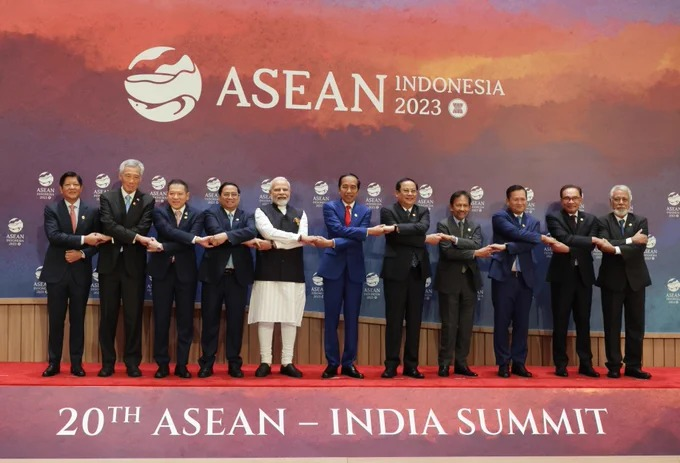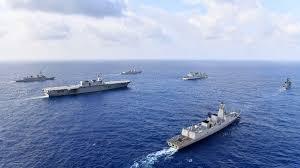Myanmar’s bloody civil strife and the South China Sea territorial disputes, which have dragged on without any solution in sight, figured high on the agenda during East Asia and India-ASEAN Summit at Jakarta, Indonesia.
Concerns were raised over the US-China rivalry in the region, although no name was specifically called. Chinese Prime Minister Li Qiang and U.S. Vice President Kamala Harris were in attendance. Russian Foreign Minister Sergey Lavrov also took part.
Indonesia’s president issued a stark warning Thursday after wrapping up a summit of Southeast Asian countries that was joined by China, the United States and Russia, saying “we will be destroyed” unless conflicts are resolved. The three-day summit by leaders of the Association of Southeast Asian Nations along with Asian and Western counterparts in the Indonesian capital of Jakarta spotlighted major conflicts in Asia with calls for peaceful resolutions and restraint.
Prime Minister Narendra Modi on Thursday, Sept 7, presented a 12-point proposal to expand cooperation between India and 10-nation ASEAN in a range of areas.
Establishment of a multi-modal connectivity and economic corridor linking South East Asia, India, West Asia and Europe and offering to share New Delhi’s digital public infrastructure stack with ASEAN partners are among the proposals announced by Modi at the annual ASEAN-India summit in this Indonesian capital. Connectivity, trade and digital transformation will get focused attention importantly PM Modi also called for building a rules-based post-COVID world order.
In a joint statement on maritime cooperation, the two sides agreed to deepen their comprehensive strategic partnership with concrete actions through practical implementation of the ‘Plan of Action’ to implement the ASEAN-India partnership for peace, progress and shared prosperity.
The document said it was agreed to support India’s connectivity initiatives in the region to ensure seamless connectivity in the Indo-Pacific, besides boosting cooperation in a range of areas including blue economy, space and food security among others.
The 12-point proposals also included the prime minister’s call for collective fight against terrorism, terror financing and cyber-disinformation as well as to raise issues being faced by Global South in multilateral fora.
The Association of Southeast Asian Nations (ASEAN) is considered one of the most influential groupings in the region, and India and several other countries including the US, China, Japan and Australia are its dialogue partners.
In his remarks, Modi reaffirmed the ASEAN centrality in the Indo-Pacific and highlighted the synergies between India’s Indo-Pacific Ocean’s Initiative (IPOI) and ASEAN’s Outlook on the Indo-Pacific (AOIP). He also emphasized the need to complete the review of ASEAN-India FTA (AITIGA) in a time bound manner.
In his address at the summit, Modi said that progress towards a free and open Indo-Pacific and elevating the voice of the Global South is in the common interest of all.
In his opening remarks, Modi described the grouping as the epicentre of growth and that New Delhi is committed to working “shoulder to shoulder” with it.
The prime minister also reaffirmed that ASEAN is the central pillar of India’s Act East Policy and it fully supports ASEAN centrality and its outlook on the Indo-Pacific. It was the first summit between the two sides since the elevation of their ties to a comprehensive strategic partnership last year.
The prime minister’s 12-point roadmap included an ASEAN-India fund for digital future focusing on cooperation in digital transformation and financial connectivity and an announcement on renewal of support to the Economic and Research Institute of ASEAN and East Asia (ERIA). The 10 member countries of ASEAN are Indonesia, Malaysia, the Philippines, Singapore, Thailand, Brunei, Vietnam, Laos, Myanmar and Cambodia.
“I can guarantee you, if we are not able to manage differences, we will be destroyed “If we join the currents of rivalry, we will be destroyed,” Indonesian President Joko Widodo, who led the 10-nation ASEAN this year, told a news conference after the summit talks.
Modi waxes eloquence making veiled attack against China: Is Beijing forced to stay 'cool' and What does it mean to the world?
It was more than an assertive Narendra Modi, India's Prime Minister and host of G-20, at Jakarta while addressing two important Summits - the East Asia meet and India-ASEAN Summit.
He made a short trip, less than 24 hours, did his job at the Summits and is back home overseeing the grand preparations for the arrival of world leaders and a galaxy of international invitees for this year's super mega diplomatic event - G-20 Summit.
At the East Summit, Modi said, "India believes that the Code of Conduct for South China Sea should be effective and in accordance with UNCLOS. Additionally, it should take into consideration the interests of countries that are not directly involved in the discussions".
He also said, "The need of the hour is such that an Indo-Pacific - where international law, including UNCLOS, is equally applicable to all countries; where there is freedom of navigation and overflight; and where there is unimpeded lawful commerce for the benefit of everyone".
This issue is directly linked to China, whose President Xi Jinping has decided to stay away from the Delhi Summit. Xi has never missed G20 Meet.
The forum - even Chinese experts cannot disagree - is the most important platform today for emerging nations and industrialised countries. India has downplayed Xi's absence, but it is also a fact that between New Delhi and Beijing there is rivalry vis-a-vis leadership aspirations for the Global South.
The boundary skirmishes remain where they are nevertheless. In terms of economy, while India is catching up and likely to emerge as Number 3, China's economy has been weakening for a plethora of reasons. Of course Beijing has so far kept things 'secret'. However, reports that Xi Jinping was reprimanded by party elders do not augur for anyone who would like to keep a pro-Beijing stance in the meeting room.
Is China forced to 'cool', and does that imply armed with set ups like QUAD and a much friendly America, India will boom?
Felix Lee of 'China Table' told Dowjones TV, "Officially there is no reason why Xi is not attending the G20 Summit in Delhi...But I think, its not so much against India...There are rivalries and border disputes but they exist for a longer time. I don't think this is the current reason why he is not attending".
"If I would interpret something, I think Xi Jinping wants to show that G20 is not the most important meeting. This is more meant against the western countries".
In May 2022, a Joint Statement issued at the end of Quad Summit in Tokyo displayed unequivocal unity of purpose among member nations - India, Japan, Australia and the US - on matters concerning China.
“The Quad is committed to cooperation with partners in the region who share the vision of a free and open Indo-Pacific….We will champion adherence to international law, particularly as reflected in the UN Convention on the Law of the Sea (UNCLOS), and the maintenance of freedom of navigation and overflight, to meet challenges to the maritime rules-based order, including in the East and South China Seas," it said.
These were clear references to Beijing’s aggressive behaviours. UNCLOS is a touchy subject for China, and if Modi spoke on it in Jakarta there could be some purpose. Does it imply India is becoming bolder in the South China sea?
Similarly at the India-ASEAN Summit, Narendra Modi said: "Our history and geography connect India and ASEAN. Along with shared values, regional unity, Peace, prosperity, and a shared belief in a multipolar world also binds us together. ASEAN is the central pillar of India's Act East Policy".
"India fully supports ASEAN centrality and ASEAN's outlook on the Indo-Pacific. ASEAN holds a prominent place in India's Indo-Pacific initiative."
Modi also stated, "The 21st century is Asia's century. Hum sab ki sadi hae (The century belongs to all of us)".
"For this, it is necessary to build a rule-based post-COVID world order and efforts by all for human welfare."
Xi has stayed away from an important ASEAN exercise too and premier Li Qiang had replaced him. This conference was called ASEAN-Plus 3 --- that included China, South Korea and Japan and hence 'were relevant'. Xi's representative Li Qiang sounded more than just being cautious.
"....It is very important to oppose taking sides, oppose block confrontation and oppose any cold war". What's wrong or right with China of 2023?
Bullying - an inherent feature of Cold war diplomacy was never a problem area for Beijing.
China's recent map controversies have left several countries anguished - they are India, Japan, the Philippines, Malaysia, Taiwan and Vietnam. Some ASEAN members know by now whom to trust !
Importantly, there could be another reason for Xi Jinping skipping both ASEAN meets at Jakarta and of course G20 in Delhi. Analysts feel the Chinese president probably feels it would be prudent not to leave China at this juncture. One, economy is in poor shape and there may be some political turmoil in the backyards - the international community may not even know about.
But yet again as they say, fortune favours the 'brave' or someone who treads into a new path. Modi has done that. He has been one of the assertive Indian leaders - often flexing muscles when it came to some international issues -- say in dealing with Pakistan in 2019. Observers know PM Modi and his government have never shied away from displaying an ambition that India would like to get the leadership of Global South.
Mark these words of Minister of External Affairs, Dr S Jaishankar, "When India assumed the G20 Presidency last December, we were acutely conscious that most of the Global South will not be at the table when we meet. This mattered very much ....To discuss their concerns without providing a fair hearing appeared extremely unfair. And India, itself a part of the Global South, would not stand by and let that happen."
Therefore, he pointed out, "Prime Minister Narendra Modi decided to convene the Voice of The Global South Summit in January 2023. We heard from 125 nations directly about their challenges and priorities. And on their behalf, these have been made central to the G20 agenda."
Is the balance of power happening, destination Asia?
ends










No comments:
Post a Comment